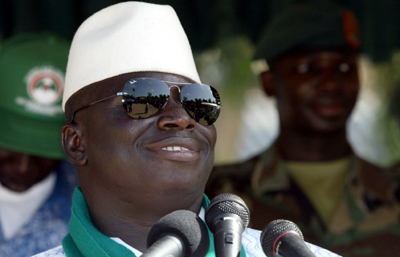Last week, Gambian President Yahya Jammeh participated in a rare meeting with select members of the West African nation’s press corps. Jammeh spoke in favor of access to public information. He announced that he would allow The Standard newspaper to resume publication, five months after the National Intelligence Agency forced its editor, Sheriff Bojang, to halt production. But the president largely lashed out at the Gambian private press and critics of his repressive media policies in the meeting, a tense session that was broadcast on state television. Jammeh, a former army captain who seized power in a 1994 coup, spoke in a harsh and contemptuous tone as he addressed media owners invited to the State House in the capital, Banjul.
“If anybody thinks that this is a mere public relations stunt, you’re mistaken,” Jammeh told journalists and a few officials present. “What you perceive as a reality is not reality,” he said, chastising journalists for portraying the image that “Yahya Jammeh is a monster, he’s a dictator, he’s a killer, that Gambia is not a place for journalists.'” He insisted that he was not hostile to the press. “You think I’m stupid? I don’t like the press, I don’t like the freedom of press and I allow newspapers? I want to tell you that we’re not your enemies,” he said. “You have to a positive role to play in national development, peace, and stability.”
The president was quick to narrow the scope of press freedom. “If you’re interested in development, you want peace and stability, then you don’t have anything to fear from me.” But press freedom has limits, Jammeh said, and it is he who sets those limits. “One freedom I will never give you is the freedom, the liberty to write whatever you want that you know is not true. There is press freedom, but there’s no freedom to lie.”
He added: “If I have to close any newspaper because you have violated the laws, I will close it. … I will not billahi wallahi, sacrifice the interests, the peace and stability and well-being of the Gambian people at the altar of freedom of expression, or freedom of press, or freedom of movement or freedom of whatever.”
At times, Jammeh appeared to contradict himself. “Sensationalism in journalism will not be accepted. Tell me one country where there’s no law on libel,” he said before declaring, “There’s no section that criminalizes speech. I don’t know where you got that from but as far as I am concerned, there’s no law that says that you can be taken to court and charged with a criminal offense for speech.” At least two of the journalists present–Pap Seine and Sam Sarr–could attest to the presence and use of such laws: They were jailed on criminal sedition charges in connection with a 2009 press release critical of Jammeh’s comments on the unsolved murder of editor Deyda Hydara.
Again last week, Jammeh disputed any government responsibility in the Hydara case, as well as in the case of Ebrima “Chief” Manneh, a reporter who disappeared after being arrested in 2007. “I will not kill anyone outside of the law,” he said. “You see, if I have to cut the heads of 10,000 people to save 1 million, I will do so with happiness, but on the condition that they have been sentenced by a court of law.” He went on to repeat: “We will not kill anyone clandestinely.”
Yet Jammeh referenced Manneh’s case as a “death,” and suggested the journalist might have disappeared after attempting to illegally migrate to Europe or America. The statement implied knowledge of Manneh’s fate that has not been disclosed publicly and that runs contrary to his administration’s repeated public statements. In a letter to Jammeh on Monday, CPJ called on the president to clarify his reference to Manneh’s “death” and fully disclose the government’s knowledge of the case.
“In all previous public comments, administration officials have consistently denied any knowledge of Manneh’s detention, whereabouts, or legal status,” CPJ’s letter said. “Those comments were made despite sightings of Manneh in government custody after his 2007 arrest. Government denials were also issued in response to a June 2008 ruling by the Court of Justice of the Economic Community of West African States, which found sufficient evidence to conclude Gambian authorities had improperly detained Manneh.”
Jammeh had some words of warning for the assembled journalists, accusing some of being “mouthpiece of opposition parties.” His words apparently chilled initial press coverage of the meeting; all the leading newspapers omitted the president’s comments on the Hydara and Manneh cases.
